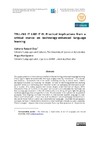Identificador persistente para citar o vincular este elemento:
https://accedacris.ulpgc.es/jspui/handle/10553/70340
| Campo DC | Valor | idioma |
|---|---|---|
| dc.contributor.author | Díaz, Adriana Raquel | en_US |
| dc.contributor.author | Hortiguera, Hugo | en_US |
| dc.date.accessioned | 2020-02-19T07:19:30Z | - |
| dc.date.available | 2020-02-19T07:19:30Z | - |
| dc.date.issued | 2016 | en_US |
| dc.identifier.issn | 1133-1127 | en_US |
| dc.identifier.uri | https://accedacris.ulpgc.es/handle/10553/70340 | - |
| dc.description.abstract | This paper presents a critical stance in the face of the technology-enhanced language learning (TELL) hype in higher education (HE). This hype, largely driven by institutional – instrumental and financial – imperatives has come under increasing scrutiny in recent times. Indeed, emerging discourses surrounding the broader context of technology-enhanced learning question the focus on technology-led innovation rather than pedagogy-led innovation as well as a number of scholarly aspects that remain largely undertheorised (cf. Bayne, 2014; Kirkwood & Price, 2013, 2014). In this paper we thus set out to articulate the challenges we face as language educators in the HE context and, in so doing, bring to light the glaring methodological gap that emerges from these. This discussion is complemented by practical examples from ongoing curricular innovation in intermediate Spanish language courses. These practical examples – drawn from an Action Research-driven pedagogic intervention on the use of PowerPoint in Spanish as a second/foreign language – illustrate the pedagogical strategies we have implemented to respond to these challenges critically, but also, creatively. These strategies integrate theoretical principles from cognitive grammar (cf. Llopis-García, 2011) and an affective engagement approach (cf. Arnold, 2000) to address specific pedagogical concerns that have emerged in these courses. | en_US |
| dc.description.abstract | Este artículo presenta una postura crítica frente al discurso hiperbólico potenciado por el uso de la tecnología en el aprendizaje de idiomas (TELL), específicamente, en el contexto universitario. Este discurso, impulsado en gran medida por las exigencias institucionales de carácter instrumental y financiero ha sido objeto de un intenso escrutinio en los últimos tiempos. Concretamente, este discurso ha sido cuestionado por su tendencia a centrarse en un enfoque de la innovación dirigido por tecnología en lugar de la innovación dirigida por la pedagogía, así como por una serie de aspectos académicos que siguen, en gran medida, escasamente estudiados (cf. Bayne, 2014; Kirkwood & Price, 2013, 2014). En este trabajo nos propusimos articular los desafíos que enfrentamos como educadores de lengua en el contexto universitario y poner así en evidencia la brecha metodológica que se desprende de estos. Esta exposición teórica se complementa con ejemplos prácticos de innovación curricular en cursos de español a nivel intermedio. Estos ejemplos prácticos – derivados de un proyecto investigación-acción sobre el uso de PowerPoint en la clase de español como segunda lengua/ lengua extranjera –ilustran las estrategias pedagógicas que hemos implementado para responder a estos desafíos, no solo de manera crítica sino también creativa. Estas estrategias integran los principios teóricos de la gramática cognitiva (cf. Llopis- García, 2011) y un enfoque en la dimensión afectiva del aprendizaje (cf. Arnold, 2000) que nos sirvieron para abordar las preocupaciones pedagógicas que han surgido en estos cursos. | en_US |
| dc.language | eng | en_US |
| dc.relation.ispartof | LFE. Revista de Lenguas para Fines Específicos | en_US |
| dc.source | LFE. Revista de lenguas para fines específicos [eISSN 2340-8561], v. 22 (1), p. 54-79 | en_US |
| dc.subject | 570107 Lengua y literatura | en_US |
| dc.subject | 550510 Filología | en_US |
| dc.subject.other | Technology-enhanced language learning | en_US |
| dc.subject.other | Cognitive grammar | en_US |
| dc.subject.other | Spanish | en_US |
| dc.title | TELL-ING IT LIKE IT IS: Practical implications from a critical stance on technology-enhanced language learning | en_US |
| dc.type | info:eu-repo/semantics/article | en_US |
| dc.type | Article | en_US |
| dc.identifier.doi | 10.20420/rlfe.2016.0090 | en_US |
| dc.investigacion | Artes y Humanidades | en_US |
| dc.type2 | Artículo | en_US |
| dc.identifier.ulpgc | Sí | es |
| dc.description.esci | ESCI | |
| dc.description.dialnetimpact | 0,0 | |
| dc.description.dialnetq | Q1 | |
| dc.description.dialnetd | D3 | |
| dc.description.erihplus | ERIH PLUS | |
| item.grantfulltext | open | - |
| item.fulltext | Con texto completo | - |
| Colección: | Artículos | |
Citas de WEB OF SCIENCETM
Citations
2
actualizado el 01-mar-2026
Visitas
30
actualizado el 11-ene-2026
Descargas
47
actualizado el 11-ene-2026
Google ScholarTM
Verifica
Altmetric
Comparte
Exporta metadatos
Los elementos en ULPGC accedaCRIS están protegidos por derechos de autor con todos los derechos reservados, a menos que se indique lo contrario.
